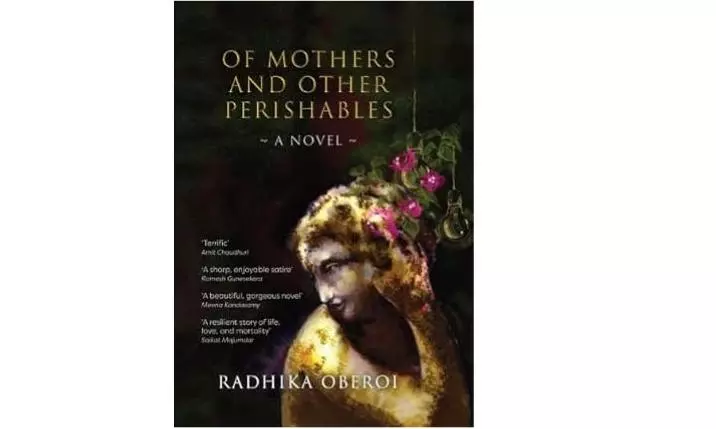Book Review | Daughter faces up to mother’s passing

If Radhika Oberoi’s book Of Mothers and Other Perishables were a painting, it would have been a stunning masterpiece. If it was a dish, it would have transported the one eating it, to culinary heaven, where culinary bliss was a given. But as it’s a book, the words entice like a temptress, their breathy whispers seduce and the different permutations tantalise and tease.
Never has grief or death been so exquisitely portrayed as done by Oberoi through the endearing voice of a dead woman who has claimed her storeroom and made it her throne, from where she watches her family, namely her husband LP, and her two daughters addressed throughout the story as The Wailer and the Toon. The elder daughter Wailer (whose name was inspired from the band Bob Marley and the Wailers) works in the advertising agency High Ground Advertising Pvt Ltd as a copywriter, while Toon, the younger one, is the CEO of a coffee startup. The sisters have a rocky relationship, more known for their silences than conversations. Though they live in the same house, they seldom bump into each other, as the Wailer prefers to spend her time in the storeroom, talking to her mother’s possessions which are housed there after her mother’s death, while Toon is busy pursuing her start-up goals.
The story is told from two points of view, an intimate first-person narrative told in the dead woman’s voice and the distant third person narrative comprising the Wailer. The dead woman’s voice invites the readers into her life, while her daughter’s narrative gives us a distant view of her world. The dead woman grew up in Delhi in the 1970s and 1980s, where romance, marriage and kids wooed her, before a disease snatched her much before her time.
The reader is drawn into the dead woman’s world and then flung into the chaotic world of advertising, the rush of deadlines and burning the midnight oil, a night before the presentation. Amidst all this, the Wailer with her colleague Nawabzada (another nickname), who is the art director in her advertising agency, takes a detour to the protests that have broken out in Delhi in a place called Kalindi Kunj, where protesters and activists stage sit-ins to raise slogans against a new bill that persecutes the Muslim community. Nawabzada’s sloganeering has made him the topic of videos and a newsmaker of sorts which ruffles the feathers of the advertising agency’s clients and he has been given a short break.
In-between the two narrations, the dead woman’s husband and the other daughter’s life stories collide. Though the two threads of the dead mother’s life and the copy-writer daughter’s life often intersect, their strands don’t tangle, but retain their separate identities and that is the beauty of this book. Oberoi’s writing is a masterclass in creativity, making the book a must read.
Rachna Chhabria is a Bengaluru based children’s authorand a freelance writer
Of Mothers and Other Perishables
Radhika Oberoi
Simon & Schuster India
pp. 298; Rs 699

